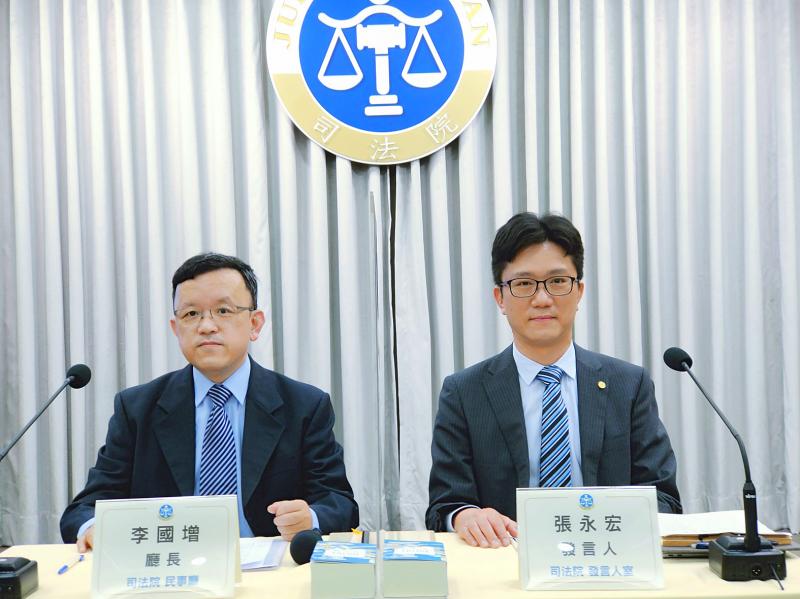The Judicial Yuan yesterday approved draft revisions to a law that would grant recognition to all international same-sex marriages, except for those involving a partner from China, and said it would send them to the Legislative Yuan for review.
The changes would apply to Article 46 of the Act Governing the Choice of Law in Civil Matters Involving Foreign Elements (涉外民事法律適用法), which states that “the formation of a marriage is governed by the national law of each party.”
In practice, this has meant that same-sex couples involving a partner from a country in which same-sex marriage is not recognized are not allowed to marry in Taiwan, or have a marriage conducted in a third country legally recognized.

Photo: Wu Cheng-feng, Taipei Times
The Judicial Yuan said in a news release that it had recommended changing the law to allow and recognize such marriages as long as one of the partners is Taiwanese.
It explained the decision by noting that same-sex marriage is legal in only 29 countries around the world.
Despite its recommendation, the Judicial Yuan said the changes would not apply to couples involving a partner from China, which is subject to separate laws governing Taiwan-China relations.
However, the new rules would apply to couples involving a partner from Hong Kong or Macau, which fall under another jurisdiction, the Judicial Yuan said.
The draft revisions are to be sent to the Executive Yuan before they are jointly submitted by the two government branches to the Legislative Yuan for its review.
The Council of Grand Justices on May 24, 2017, ruled that the nation’s Civil Code provisions that did not allow same-sex marriage were unconstitutional, giving the government two years to amend them.
In May 2019, the Legislative Yuan passed a marriage equality law extending to same-sex couples almost all the marriage rights available to heterosexual couples under the Civil Code.
The law took effect on May 24, 2019, making Taiwan the first country in Asia to legalize same-sex marriage.

DAREDEVIL: Honnold said it had always been a dream of his to climb Taipei 101, while a Netflix producer said the skyscraper was ‘a real icon of this country’ US climber Alex Honnold yesterday took on Taiwan’s tallest building, becoming the first person to scale Taipei 101 without a rope, harness or safety net. Hundreds of spectators gathered at the base of the 101-story skyscraper to watch Honnold, 40, embark on his daredevil feat, which was also broadcast live on Netflix. Dressed in a red T-shirt and yellow custom-made climbing shoes, Honnold swiftly moved up the southeast face of the glass and steel building. At one point, he stepped onto a platform midway up to wave down at fans and onlookers who were taking photos. People watching from inside

A Vietnamese migrant worker yesterday won NT$12 million (US$379,627) on a Lunar New Year scratch card in Kaohsiung as part of Taiwan Lottery Co’s (台灣彩券) “NT$12 Million Grand Fortune” (1200萬大吉利) game. The man was the first top-prize winner of the new game launched on Jan. 6 to mark the Lunar New Year. Three Vietnamese migrant workers visited a Taiwan Lottery shop on Xinyue Street in Kaohsiung’s Gangshan District (崗山), a store representative said. The player bought multiple tickets and, after winning nothing, held the final lottery ticket in one hand and rubbed the store’s statue of the Maitreya Buddha’s belly with the other,

‘NATO-PLUS’: ‘Our strategic partners in the Indo-Pacific are facing increasing aggression by the Chinese Communist Party,’ US Representative Rob Wittman said The US House of Representatives on Monday released its version of the Consolidated Appropriations Act, which includes US$1.15 billion to support security cooperation with Taiwan. The omnibus act, covering US$1.2 trillion of spending, allocates US$1 billion for the Taiwan Security Cooperation Initiative, as well as US$150 million for the replacement of defense articles and reimbursement of defense services provided to Taiwan. The fund allocations were based on the US National Defense Authorization Act for fiscal 2026 that was passed by the US Congress last month and authorized up to US$1 billion to the US Defense Security Cooperation Agency in support of the

HIGH-TECH DEAL: Chipmakers that expand in the US would be able to import up to 2.5 times their new capacity with no extra tariffs during an approved construction period Taiwan aims to build a “democratic” high-tech supply chain with the US and form a strategic artificial intelligence (AI) partnership under the new tariffs deal it sealed with Washington last week, Taipei’s top negotiator in the talks said yesterday. US President Donald Trump has pushed Taiwan, a major producer of semiconductors which runs a large trade surplus with the US, to invest more in the US, specifically in chips that power AI. Under the terms of the long-negotiated deal, chipmakers such as Taiwan Semiconductor Manufacturing Co (TSMC, 台積電) that expand US production would incur a lower tariff on semiconductors or related manufacturing